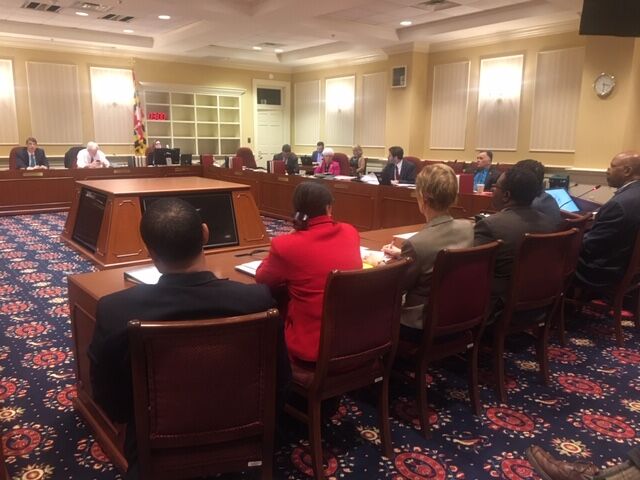This article was republished with permission from WTOP’s news partners at Maryland Matters. Sign up for Maryland Matters’ free email subscription today.

The measures would authorize the Maryland Stadium Authority to spend $375 million to mostly gut and rebuild both facilities. They are backed by influential lawmakers — House Speaker Adrienne A. Jones (D-Baltimore County) and Sen. Guy J. Guzzone (D-Howard), chairman of the Budget and Taxation Committee, are the leading sponsors of the legislation.
Leaders of organizations that serve Park Heights, the northwest Baltimore neighborhood that surrounds Pimlico, lavished praise on the proposal at both hearings.
“This plan paves the way for an holistic, equitable approach for further redevelopment,” Baltimore City Councilwoman Sharon Green Middleton (D) told the Senate panel. “It will stimulate the local economy through real estate projects, streetscape programs and provide… comprehensive education and outreach programs.”
“Keeping the Preakness in Baltimore in very important,” Middleton added, echoing the view of many.
The plan to redevelop Pimlico and Laurel was crafted by representatives of The Stronach Group, the Canadian firm that owns the Maryland Jockey Club, operator of the two tracks; the City of Baltimore; the organization that represents horsemen; and others.
Their plan would keep the Preakness in the city, while shifting the bulk of the racing calendar to Laurel. The Bowie Training Center would be transferred to the City of Bowie and Bowie State University for local use.
Efforts to put racing on a firmer financial footing last year collapsed amid acrimony.
Alan M. Rifkin, an attorney representing Stronach who helped broker the agreement months later, called the plan “practical and cost-effective.”
“It hits the mark,” he said in an interview, adding that he was “humbled and encouraged” by the support the deal has received from elected and community leaders.
By slightly reorienting the Pimlico track and building ballfields in the infield, area youth will be able to use the site all year, except during the month leading up the Preakness.
“The Pimlico redevelopment will benefit the community by creating year-round use of the site,” said Lisa K. Budlow, CEO of CHAI, a neighborhood housing and community development group.
Budlow said the investment would “improve infrastructure — and inspire hope and confidence in the community.”
Bonds floated by the Maryland Stadium Authority would be repaid mostly from the state’s share of casino gambling and the lottery.
Baltimore Mayor Bernard C. “Jack” Young (D), Anne Arundel County Executive Steuart Pittman Jr. (D) and Harford County Executive Barry Glassman (R) also testified in support of the measure.
“Maryland is the place where thoroughbred racing started and there’s a built-in fan base,” said Pittman, a lifelong horseman.
“Some people will ask the question why we’re putting all of this money into horse racing, when in fact we’re doing what the voters demanded of us when they passed the referendum to start slots in Maryland, which was that some of that money would be set aside for horse racing.”
Although racing’s fan base is aging, local officials said the sport still contributes hundreds of millions of dollars to the state’s economy, creating jobs and preserving open space. And they held out hope that new facilities would draw a new generation of bettors.
The Stronach Group has pledged to keep the Preakness, the second leg of racing’s Triple Crown, in Baltimore in perpetuity, even during construction.
The legislation requires that at least $180 million be made available for the Baltimore track and no less than $155 million going to rebuild the track, grandstand, stables and worker housing at Laurel.
The Board of Public Works must approve any borrowing.
In light of recent horse deaths that have occurred at tracks around the country, the measure establishes an Equine Health, Safety, and Welfare Advisory Committee. In addition, no money can be spent on racing surfaces until the Jockey Club consults with national experts on equine safety and provides a report to legislative leaders.







